16 Unit Secretary Resume Examples
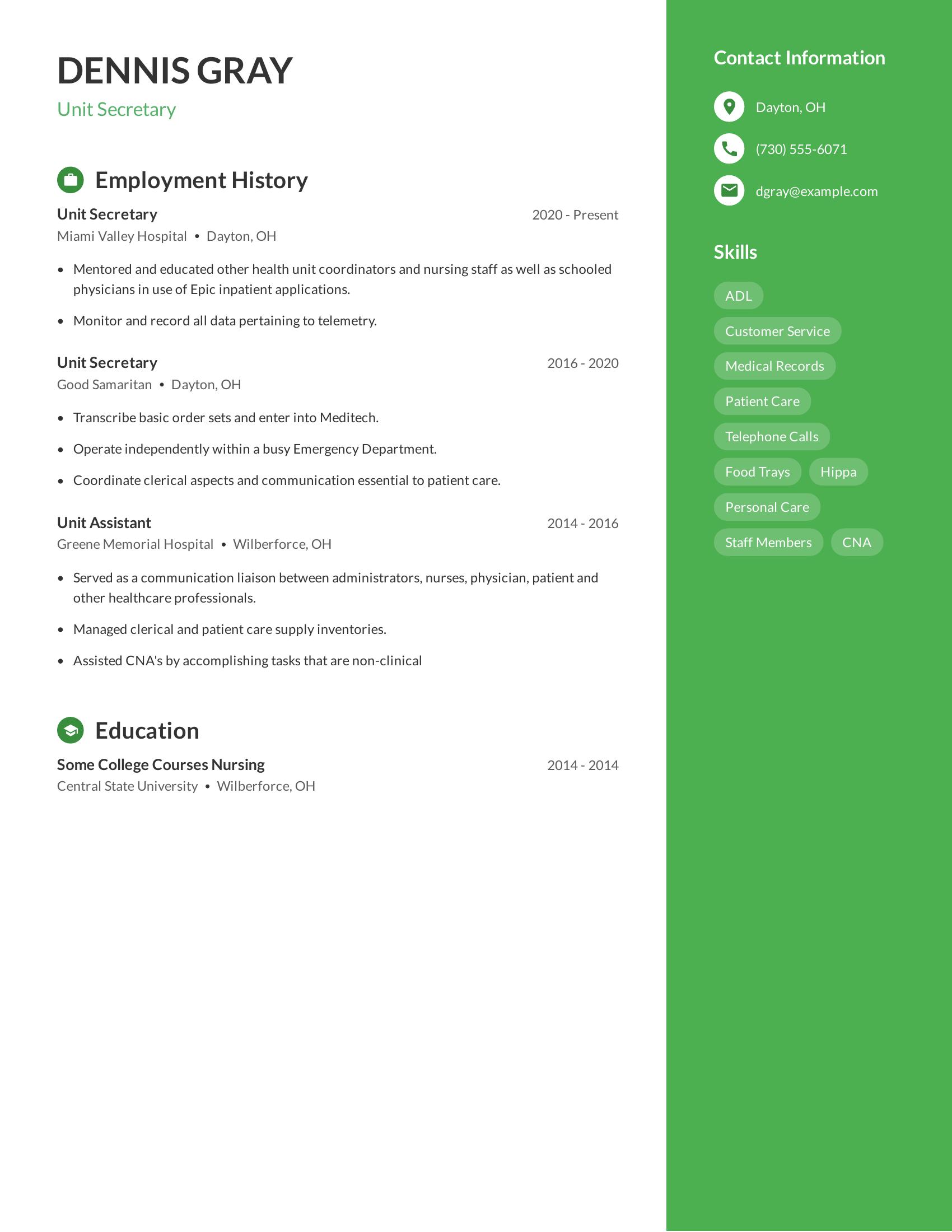



Unit secretary resumes need to show experience in healthcare settings, strong communication skills, and the ability to manage clerical tasks. They should include details about past jobs, specific tasks performed, relevant education, and skills like handling medical records and patient care. Clear contact information is also necessary.
This resume includes all these elements. It lists multiple roles as a unit secretary and unit assistant, showing experience in different hospitals. It details specific duties like mentoring staff, data monitoring, and order transcription. The resume also includes education history and a skills section with relevant abilities such as customer service and handling telephone calls.

Unit coordinator resumes should highlight relevant experience, skills specific to the role, and education in nursing or healthcare management. It is important to include job responsibilities that showcase hands-on patient care, administrative tasks, and interaction with medical staff. Key skills might include customer service, word processing, handling medical records, and familiarity with insurance processes. Educational background in nursing or a related field is also significant.
This resume effectively includes critical elements for a unit coordinator role. It lists relevant skills such as customer service and medical records management. The employment history shows progression in roles within healthcare settings, highlighting practical experience in patient care and administrative duties. The educational qualifications in nursing from a reputable college further strengthen the candidate's fit for the unit coordinator position.
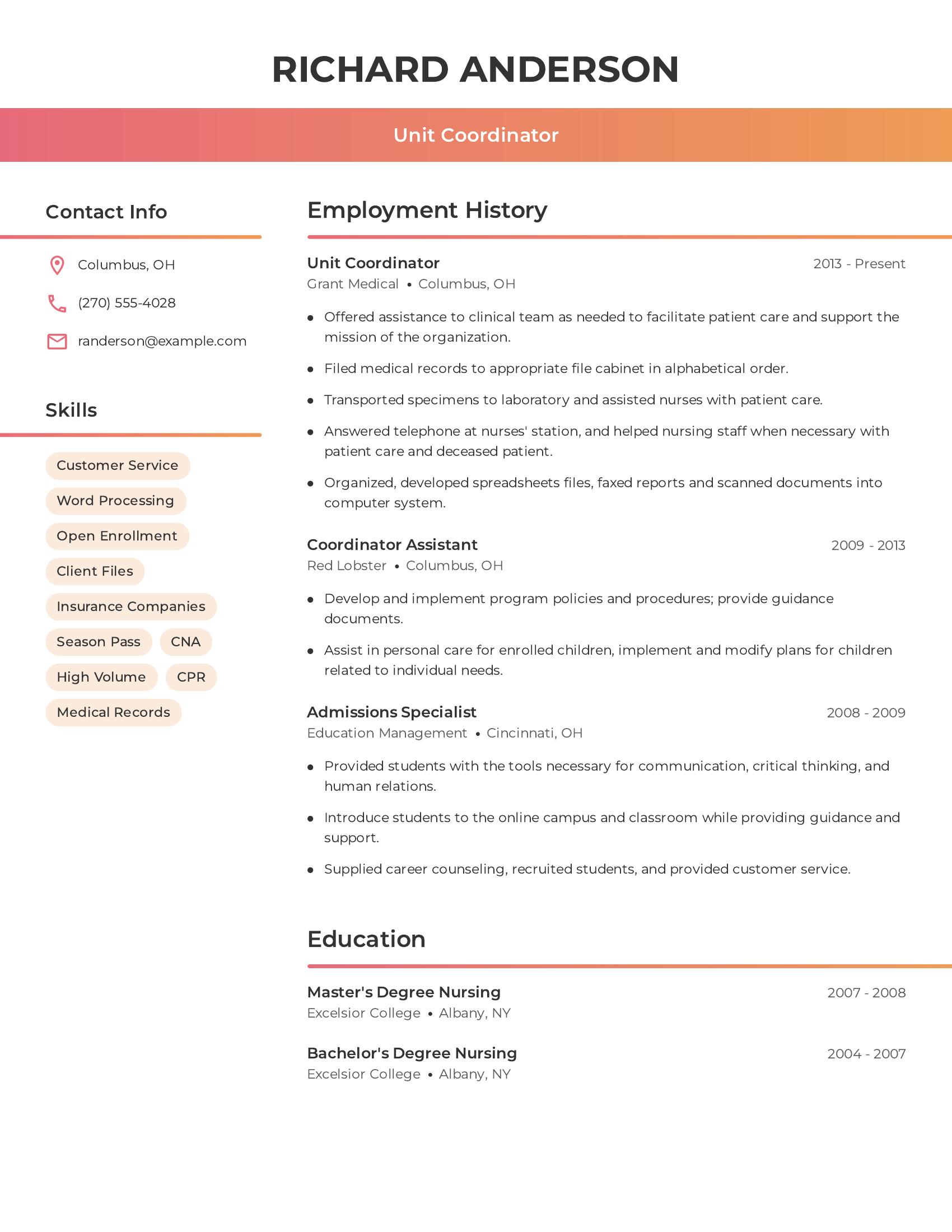
Ward secretary resumes should highlight experience in medical administration, communication, and patient care. They must show the ability to handle patient information, manage communication between departments, and process medical records efficiently. A good resume also includes relevant education and skills related to hospital administration and patient management.
This resume effectively includes the necessary elements for a ward secretary's role. It lists relevant job experiences such as managing unit-based communication, processing physician orders, and preparing patient charts. The resume also highlights education in nursing and includes specific skills like handling administrative functions and understanding physician orders.
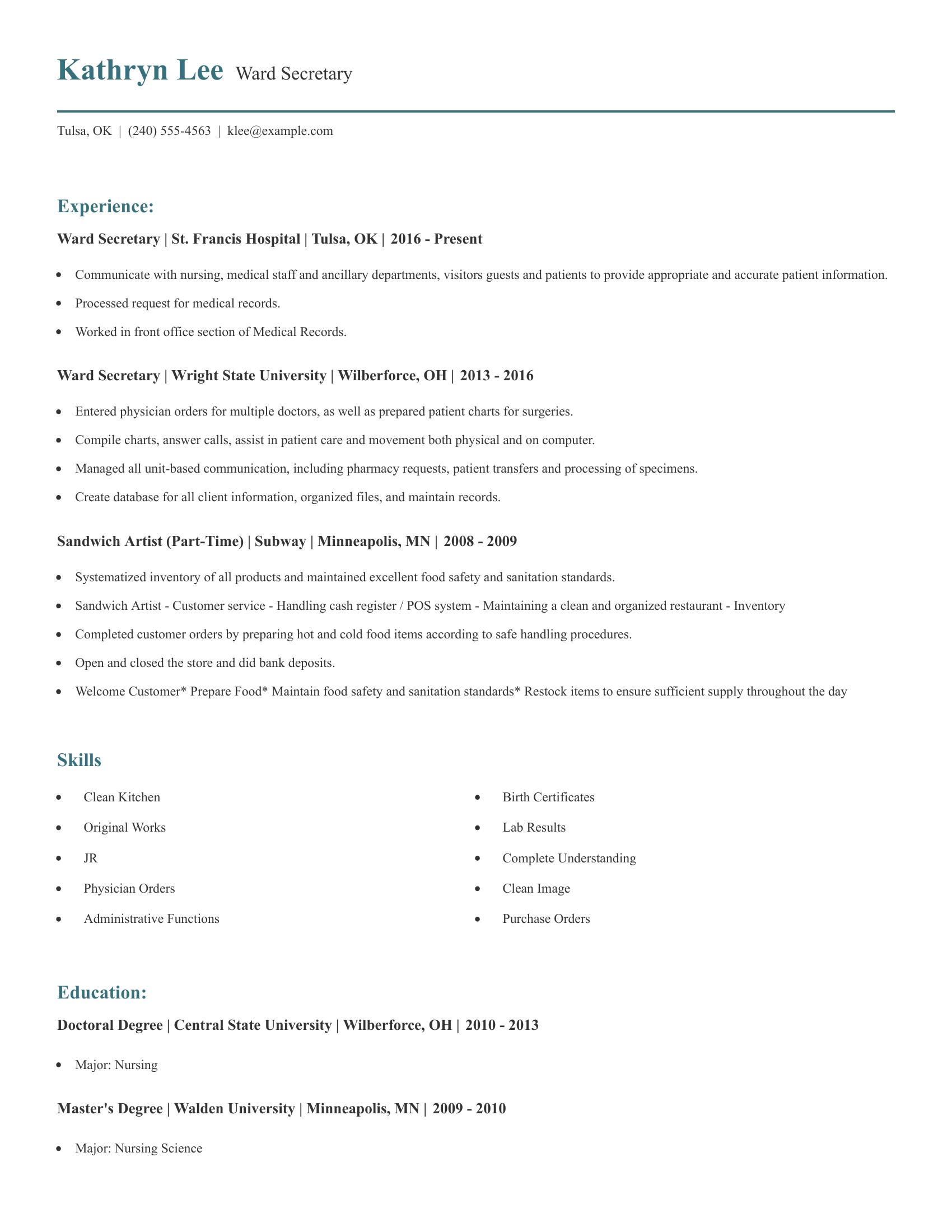
Health unit clerk resumes should highlight relevant skills, employment history, and education in a clear and concise manner. Important sections include contact information, specific job-related skills, detailed work experience, and educational background. Key skills often listed are patient care, scheduling appointments, handling telephone calls, maintaining electronic medical records, and transcribing physician orders. Work experience should reflect roles in healthcare settings, showcasing the ability to perform clerical tasks effectively and coordinate patient care. Education details should support the qualifications for the role.
This resume includes all these specifics effectively. The contact information is clearly listed at the top. The skills section highlights relevant abilities like Meditech proficiency and appointment scheduling. The employment history shows progressive roles within healthcare environments, detailing responsibilities such as coordinating patient care and transcribing physician orders. The education section provides the relevant academic background. Overall, the resume addresses all key areas needed for a health unit clerk position.
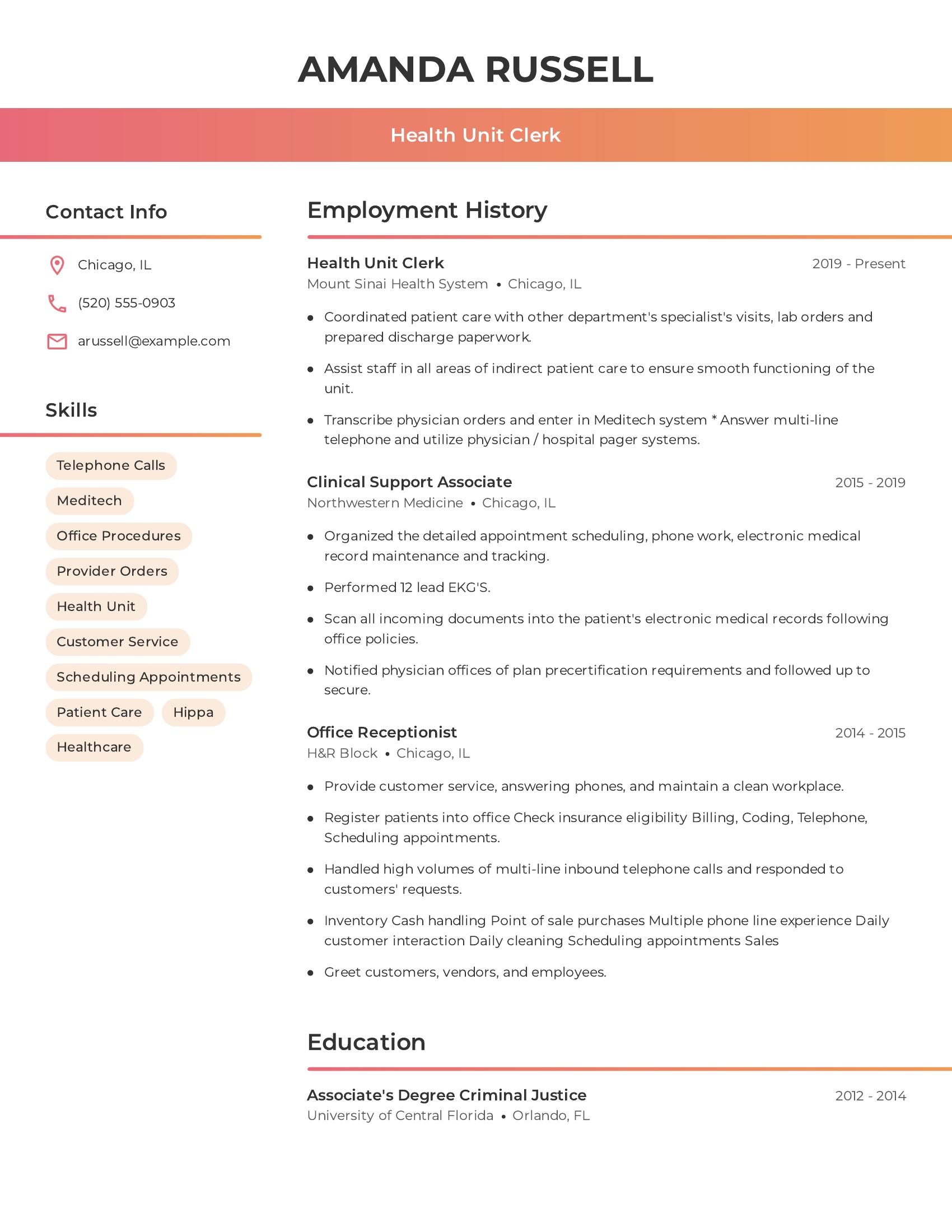
Clinical secretary resumes should highlight relevant job experience, skills, and education. Important sections include contact information, work history, skills, and education. The resume should show an understanding of office tasks, patient interaction, and familiarity with medical records. Including previous roles in healthcare settings can also strengthen the resume.
This resume effectively includes these specifics by listing relevant job positions like clinical secretary and office secretary. The skills section covers tasks like managing client files, medical records, and using office machines. The work history shows experience in healthcare environments and general office support roles. Additionally, it mentions specific medical tasks such as administering medications and measuring vital signs.
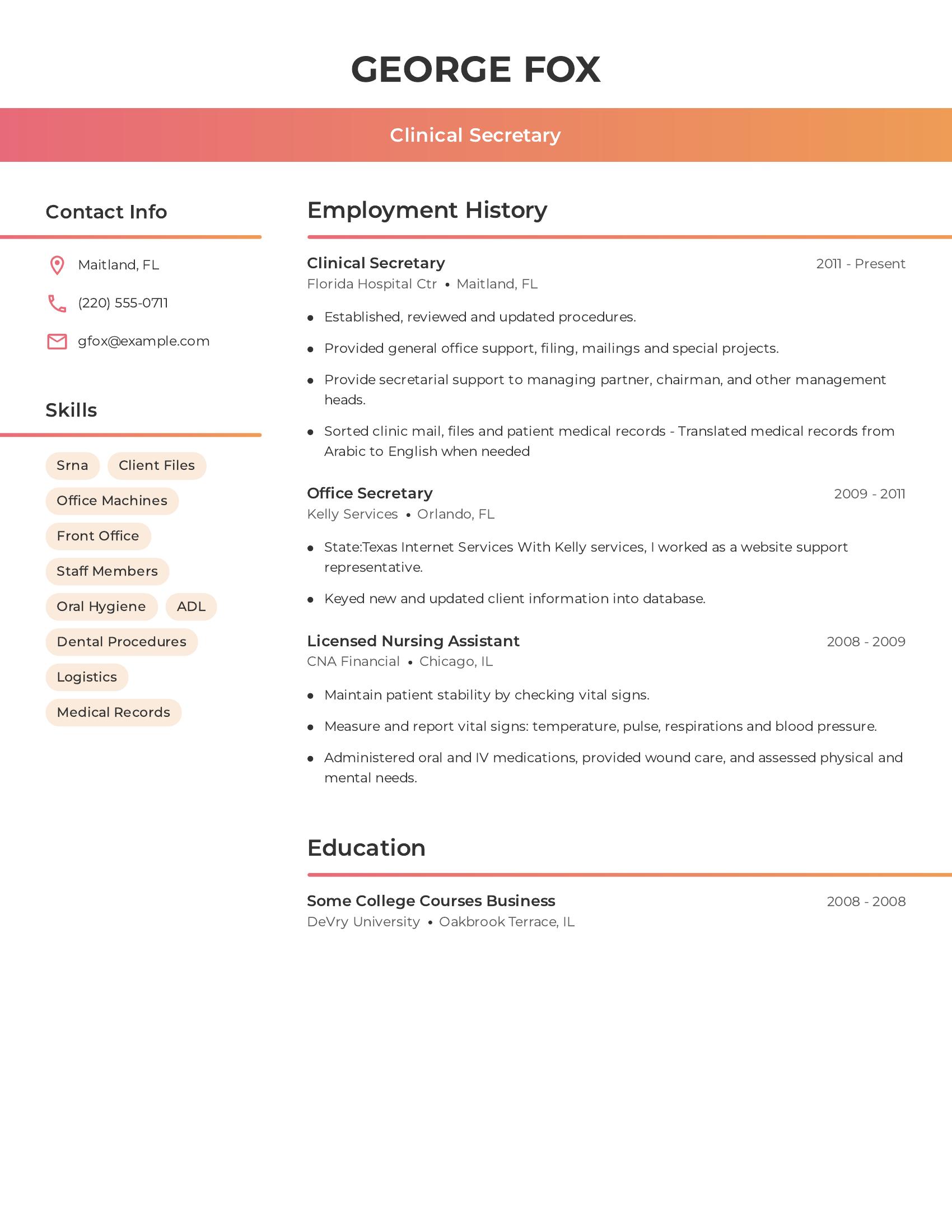
Unit support representative resumes should highlight experience with data entry, customer service, and problem resolution. They should include specific tasks such as accessing computer systems, updating data, and generating reports. Demonstrating experience in handling high-volume calls and resolving service issues is also important. Skills in assisting with patient care and coordinating events add value.
This resume includes relevant details like data input, report generation, and customer service. It demonstrates experience with both technical tasks and patient care. The resume also shows the applicant’s ability to handle various responsibilities like scheduling appointments and processing claims.
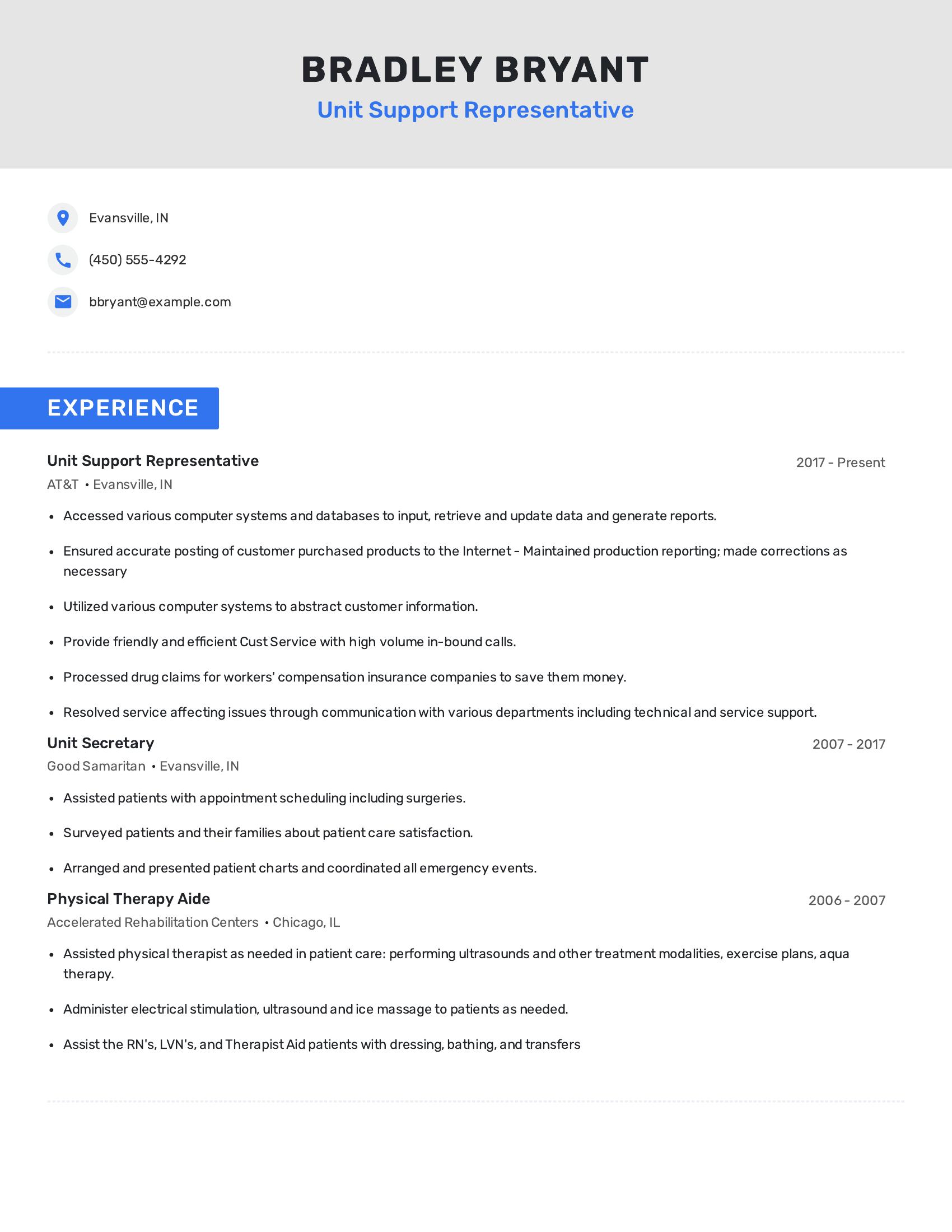
Hospital unit clerk resumes should highlight relevant experience, skills, and education. Important components include direct patient care experience, familiarity with medical forms and procedures, strong communication skills, and the ability to coordinate with healthcare teams. A good resume should also list specific job responsibilities and achievements in previous roles, along with relevant educational qualifications.
This resume includes those specifics by detailing the candidate's experience in patient care, coordination of patient services, and communication with insurance companies. It also lists skills such as specimen collection and emergency response. The employment history shows a clear progression in related roles, and the education section includes a relevant degree. This information gives a comprehensive view of the candidate's qualifications for the role of hospital unit clerk.
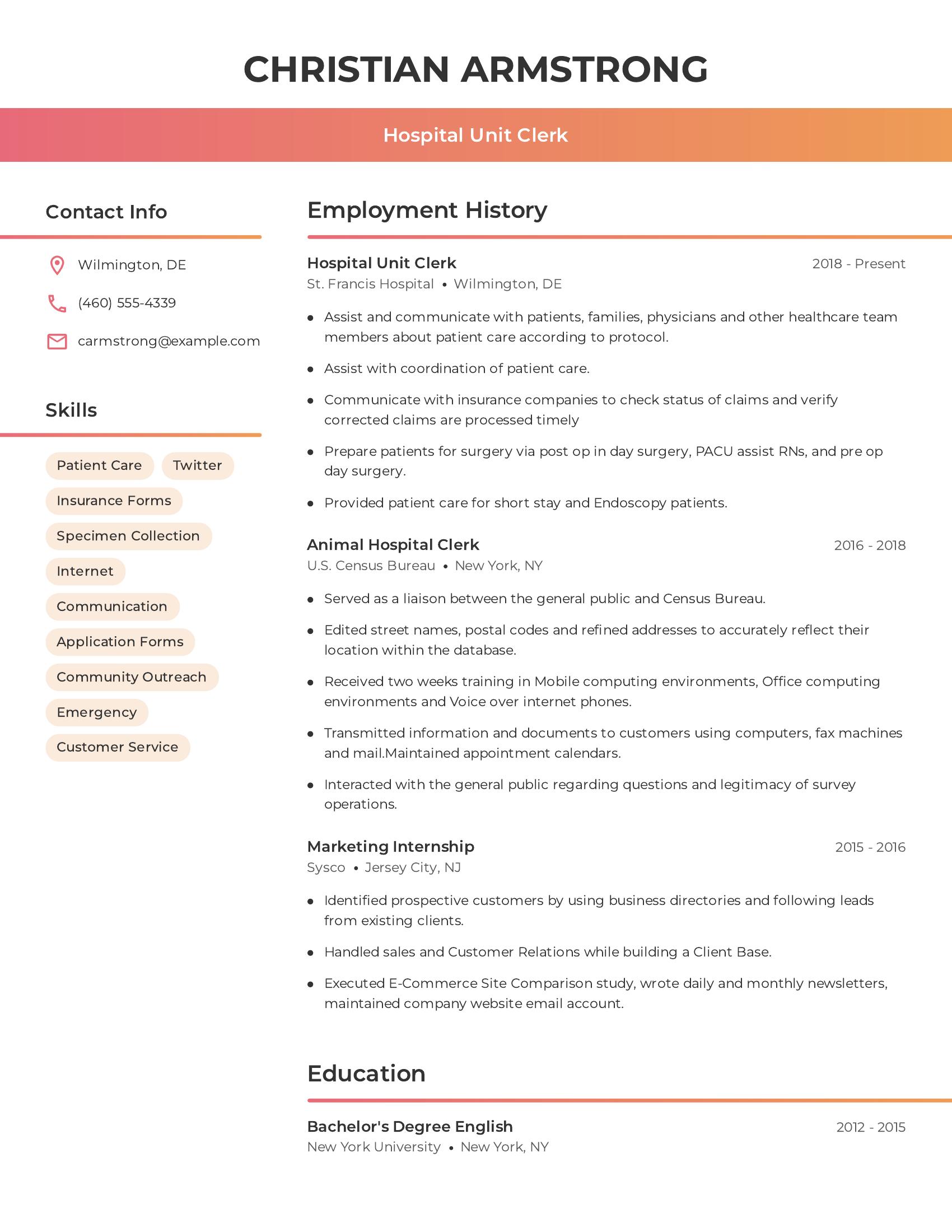
Unit assistant resumes should highlight relevant experience in patient care, administrative tasks, and support roles within a healthcare setting. Important components include job titles, specific duties performed, and periods of employment. Skills such as patient coordination, transcription of physician orders, knowledge of HIPAA regulations, and direct patient care are also vital. Education and any relevant certifications should be included to demonstrate qualifications.
This resume effectively includes these specifics by detailing the candidate's experience in coordinating patient care, assisting medical staff, handling sensitive information, and performing administrative tasks. The candidate lists their roles chronologically with clear responsibilities and skills gained at each position. Their education is also noted, which adds to their qualifications for the role.
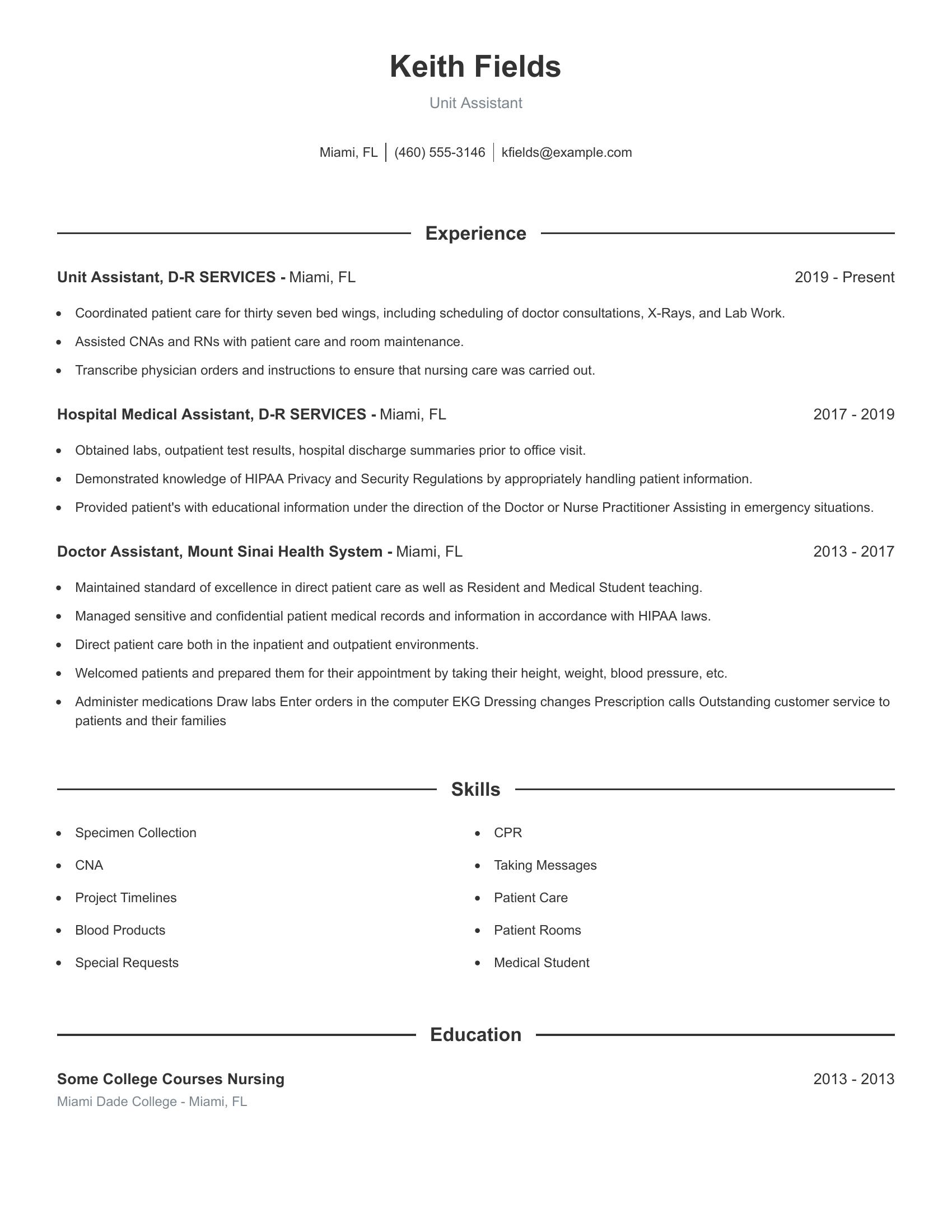
Hospital unit coordinator resumes should detail experience in patient care, administrative tasks, and communication skills. They should highlight roles in training staff, managing records, and supporting medical professionals. Experience with specific tasks like data entry, transcribing orders, and direct patient care is important. Additionally, relevant certifications or awards can enhance the resume.
This resume includes many of these elements. It lists job titles and duties clearly, showing experience in patient care and administrative functions. It mentions training new employees and specific responsibilities like transcribing orders and managing records. The inclusion of awards received during clinical rotations adds credibility to the candidate’s qualifications.
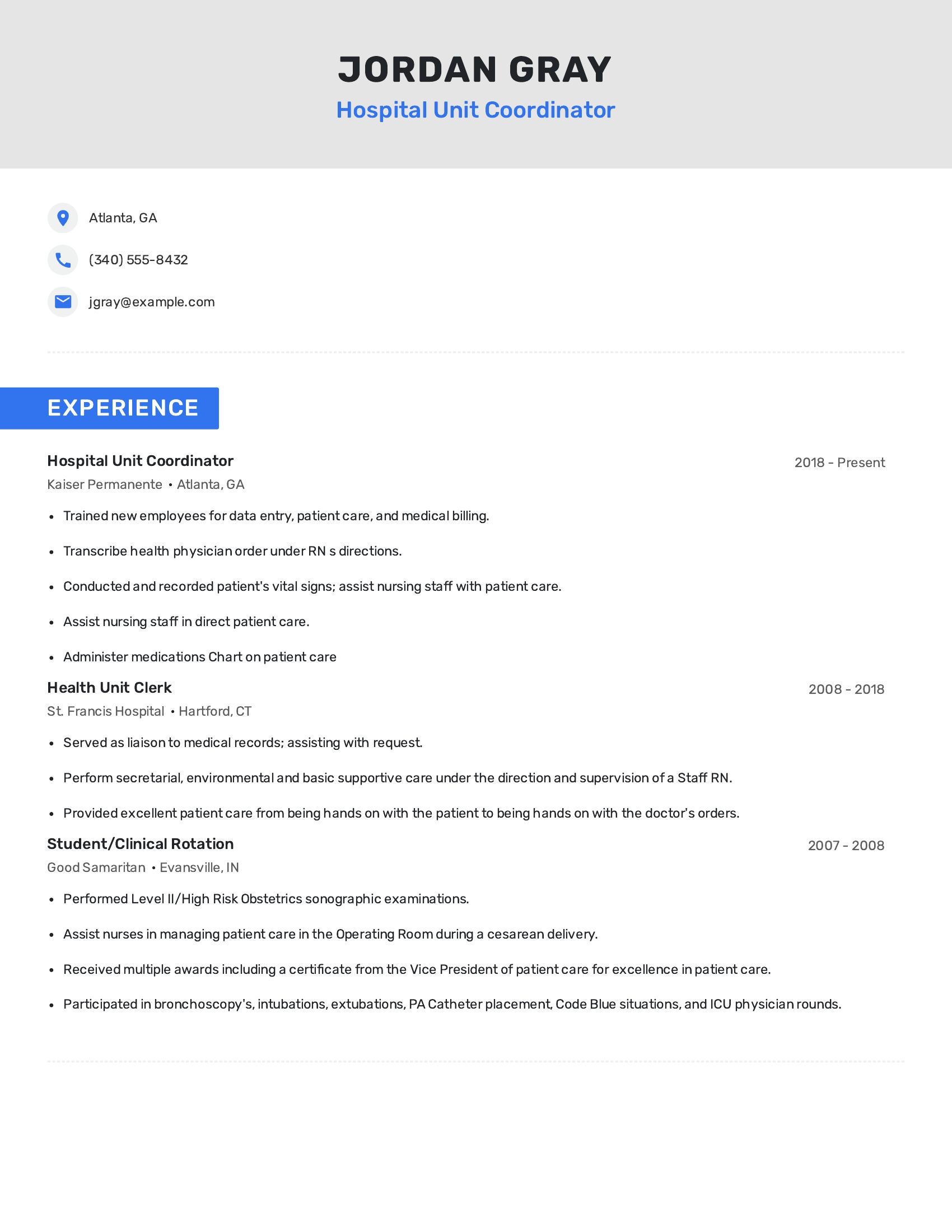
Medical office secretary resumes should highlight relevant skills, employment history, and education. Critical skills include handling insurance forms, managing medical records, and patient care. Employment history should show experience in medical settings, detailing specific tasks like verifying benefits and using medical software. Education should be in a related field like healthcare administration.
This resume includes the necessary specifics. It lists skills such as handling insurance companies, postoperative instructions, and emergency room experience. The employment history shows roles in different medical settings with tasks like entering physician orders and managing front desk operations. The education section notes a bachelor's degree in healthcare administration.
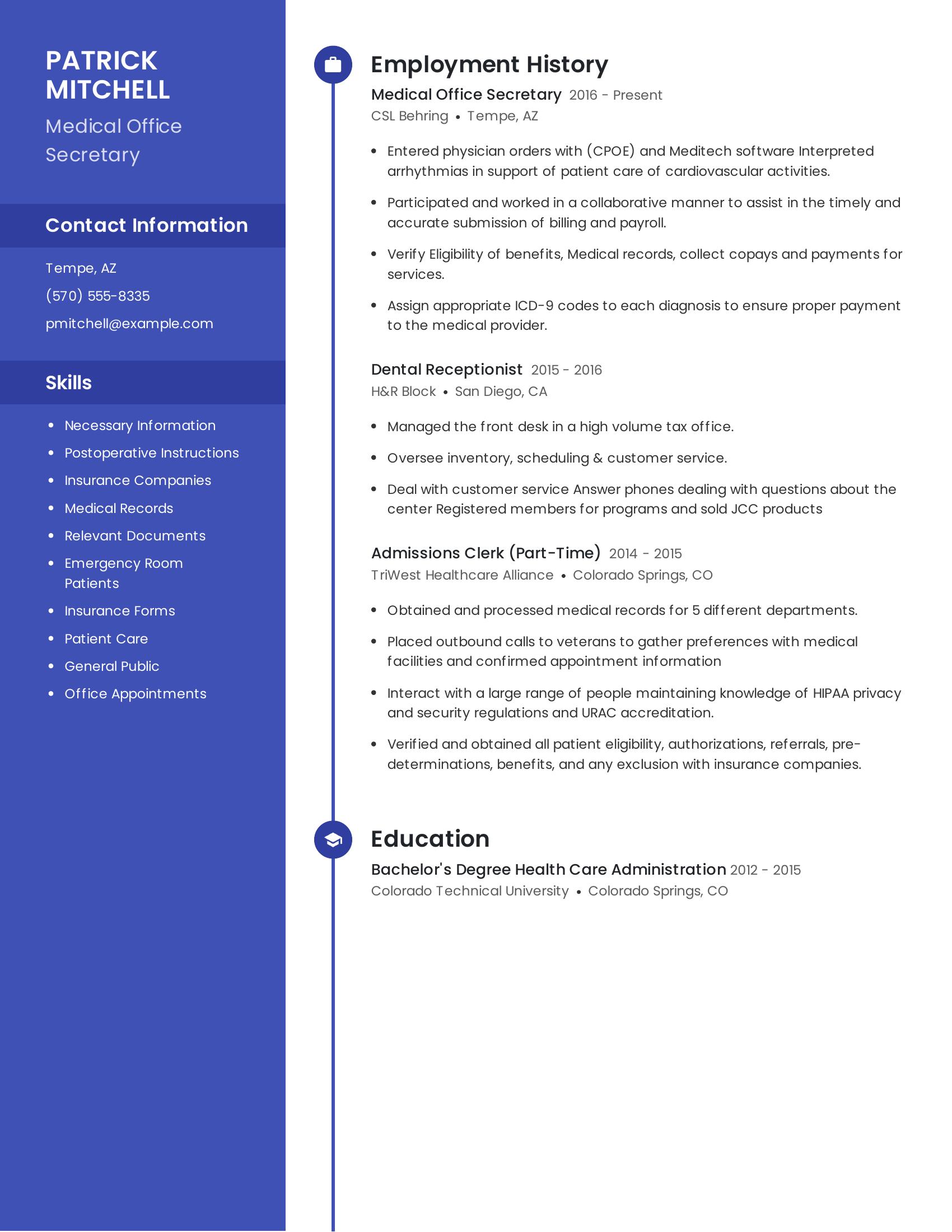
Pathology secretary/transcriptionist resumes should highlight relevant experience in medical office settings, proficiency with office software, and strong organizational skills. Key responsibilities such as managing patient records, scheduling appointments, and assisting medical professionals should be clearly outlined. Additionally, showcasing experience in customer service and technical troubleshooting can be beneficial. Educational background in medical sciences and any specialized training should also be included to demonstrate comprehensive knowledge in the field.
This resume effectively includes specific experiences in both pathology transcription and medical office roles, detailing duties such as data entry, managing patient care, and scheduling. It also highlights technical skills from a previous role as an assistant systems administrator. Furthermore, the inclusion of a bachelor's degree in medical clinical sciences from a reputable university strengthens the candidate's qualifications. The resume presents a broad range of relevant skills and experiences that are pertinent to the role of a pathology secretary/transcriptionist.
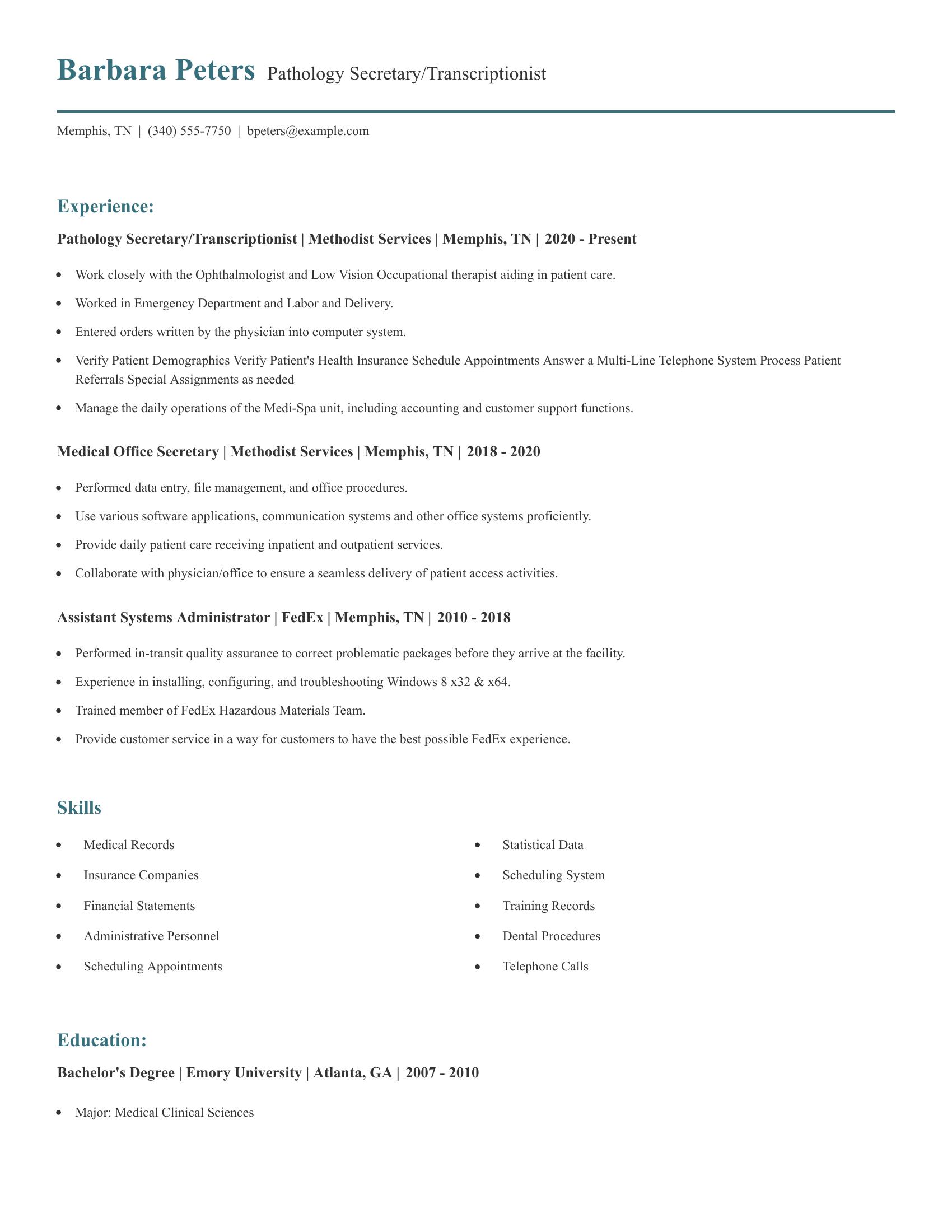
Clinical support associate resumes should highlight relevant experience in medical settings, proficiency with patient care tasks, and knowledge of medical terminology. Emphasize roles that demonstrate direct interaction with healthcare providers and patients. Skills such as data entry, communication, and understanding of medical software are important. Education should include any healthcare-related courses or certifications.
This resume includes specifics that make it strong for a clinical support associate role. It lists relevant experience in various healthcare positions, showing a broad skill set in patient care and administrative tasks. The resume also highlights practical skills like EKG, specimen collection, and scheduling appointments. Additionally, the inclusion of education related to medical assisting services is beneficial.
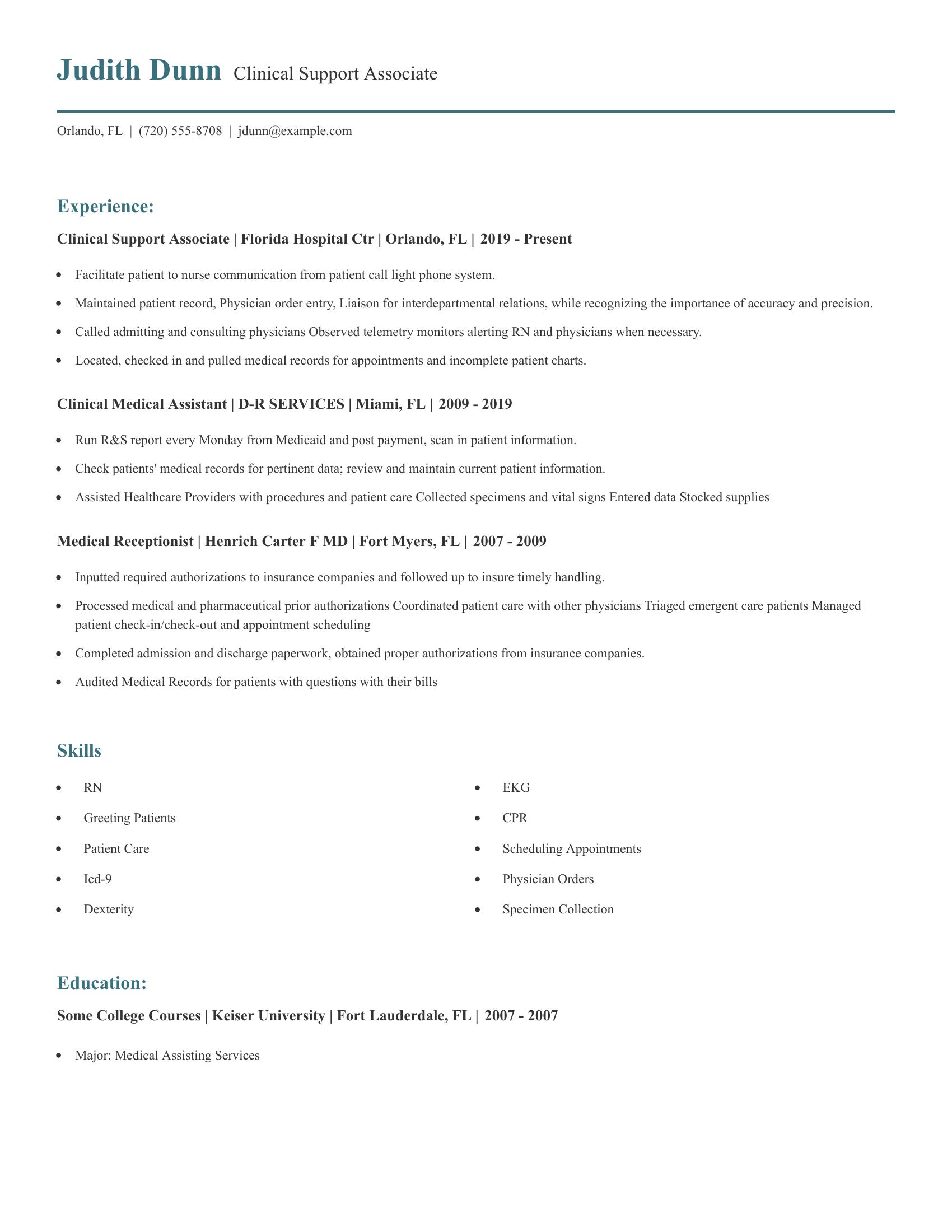
Department secretary resumes should highlight administrative experience, organizational skills, and the ability to manage office tasks effectively. Key elements include a detailed work history with specific duties, proficiency in office software, and relevant educational background. Experience in managing schedules, handling communications, and supporting multiple departments is crucial. Clear contact information and a concise summary of skills are also important.
This resume includes necessary specifics by listing extensive experience in various administrative roles. It details job responsibilities such as managing supplies, updating calendars, and facilitating financial reporting. The skills section covers a range of competencies like customer service and computer systems. The education section confirms the required qualification with a high school diploma. Contact information is clearly provided at the top.
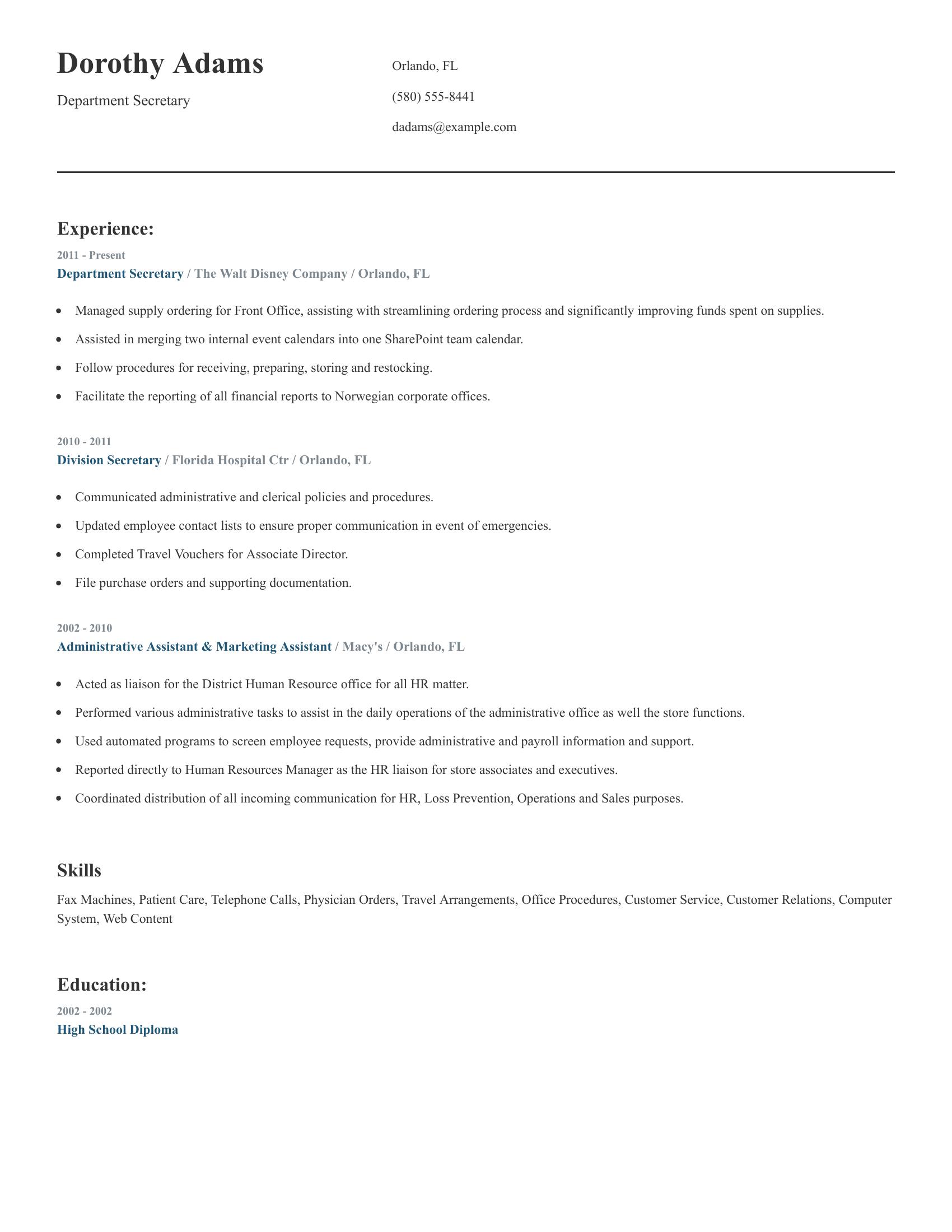
Medical office administrator resumes should highlight experience in administrative tasks, patient care, and familiarity with medical software and coding systems. They should detail specific duties like managing patient records, scheduling appointments, handling insurance verifications, and maintaining compliance with health regulations. Skills like customer service and proficiency in medical terminology are also important. A resume should showcase a history of reliability and efficiency in a medical setting.
This resume includes important specifics such as extensive experience in maintaining patient records, obtaining insurance authorizations, and using medical software. It demonstrates a solid background in front-desk reception and communication with clients. The candidate has also shown proficiency in medical coding with a high accuracy rate and experience in both full-time and part-time roles across different medical facilities. Skills listed align well with common responsibilities of a medical office administrator.
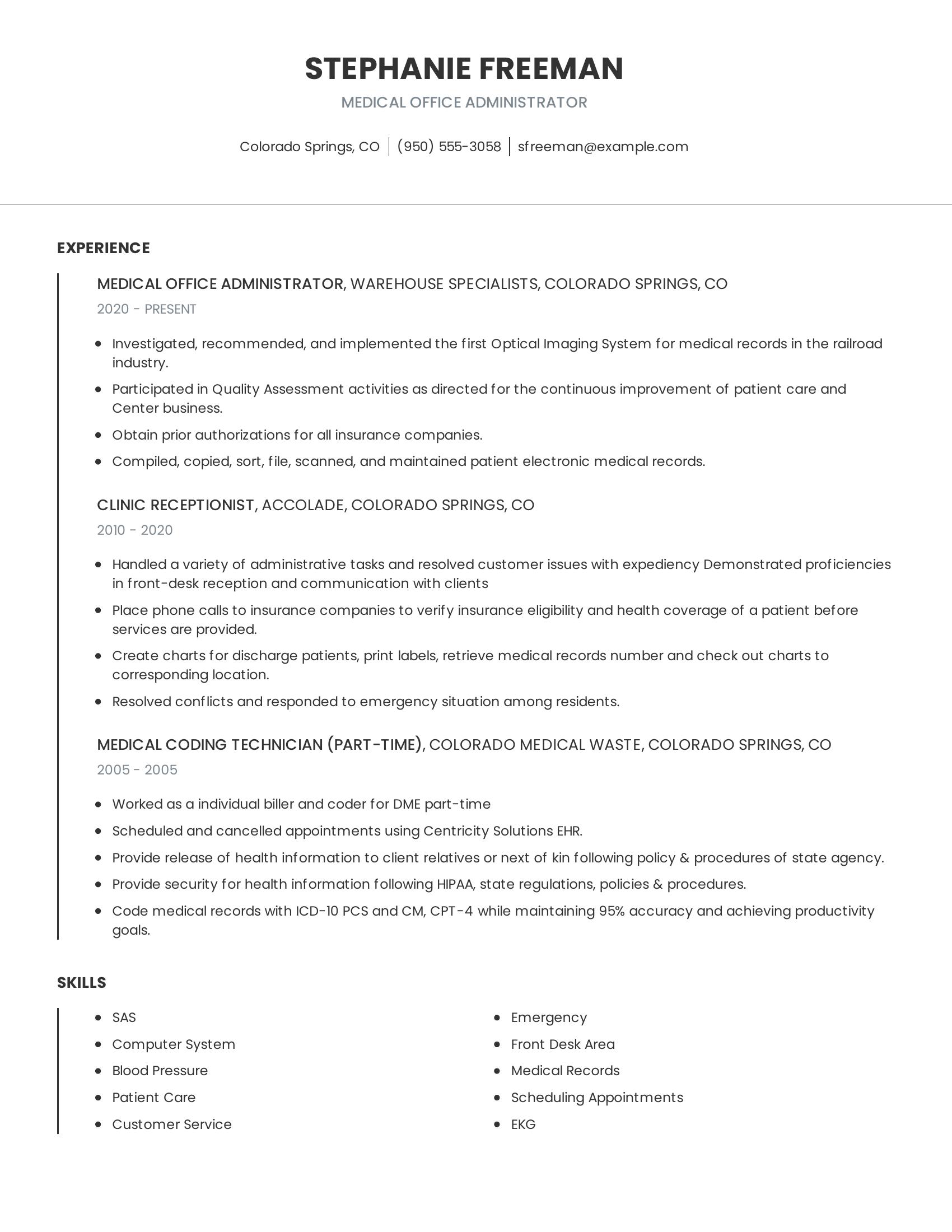
Emergency room clerk resumes should highlight experience in handling patient interactions, managing medical records, and providing administrative support in a fast-paced healthcare setting. Important elements include clear job titles, relevant work history, specific duties performed, and any relevant skills or certifications. The resume should emphasize the ability to perform tasks such as answering phones, entering patient data, assisting with triage, and maintaining patient records efficiently.
This resume effectively includes the necessary specifics by detailing various roles held in different medical environments. It outlines duties like answering phones, creating electronic patient records, and greeting patients in emergency scenarios. The listed skills show familiarity with hospital policies and medical software. Additionally, the inclusion of a certificate in medical assisting services demonstrates a formal education relevant to the position.
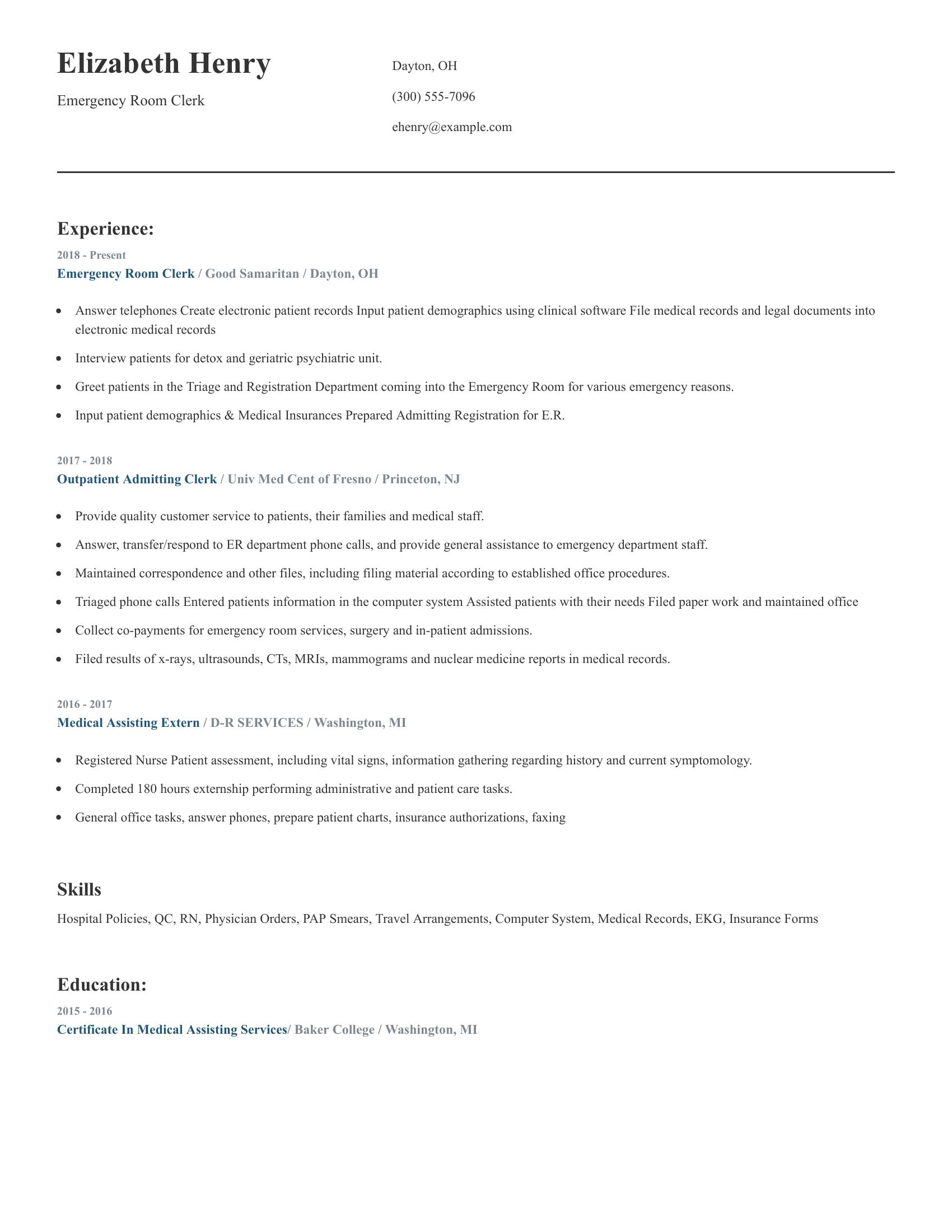
Junior secretary resumes should detail relevant skills, employment history, and education. Essential components include proficiency in handling telephone calls, scheduling appointments, and managing office supplies. Experience in secretarial support roles and customer service is vital. The resume should also highlight the ability to manage clerical tasks, support higher management, and coordinate projects.
This resume effectively includes these specifics by listing skills such as telephone calls, scheduling appointments, and customer service. The employment history outlines roles like junior secretary and assistant secretary, with duties such as handling calls, organizing meetings, and performing clerical work. The education section includes a high school diploma, which is typical for this role.
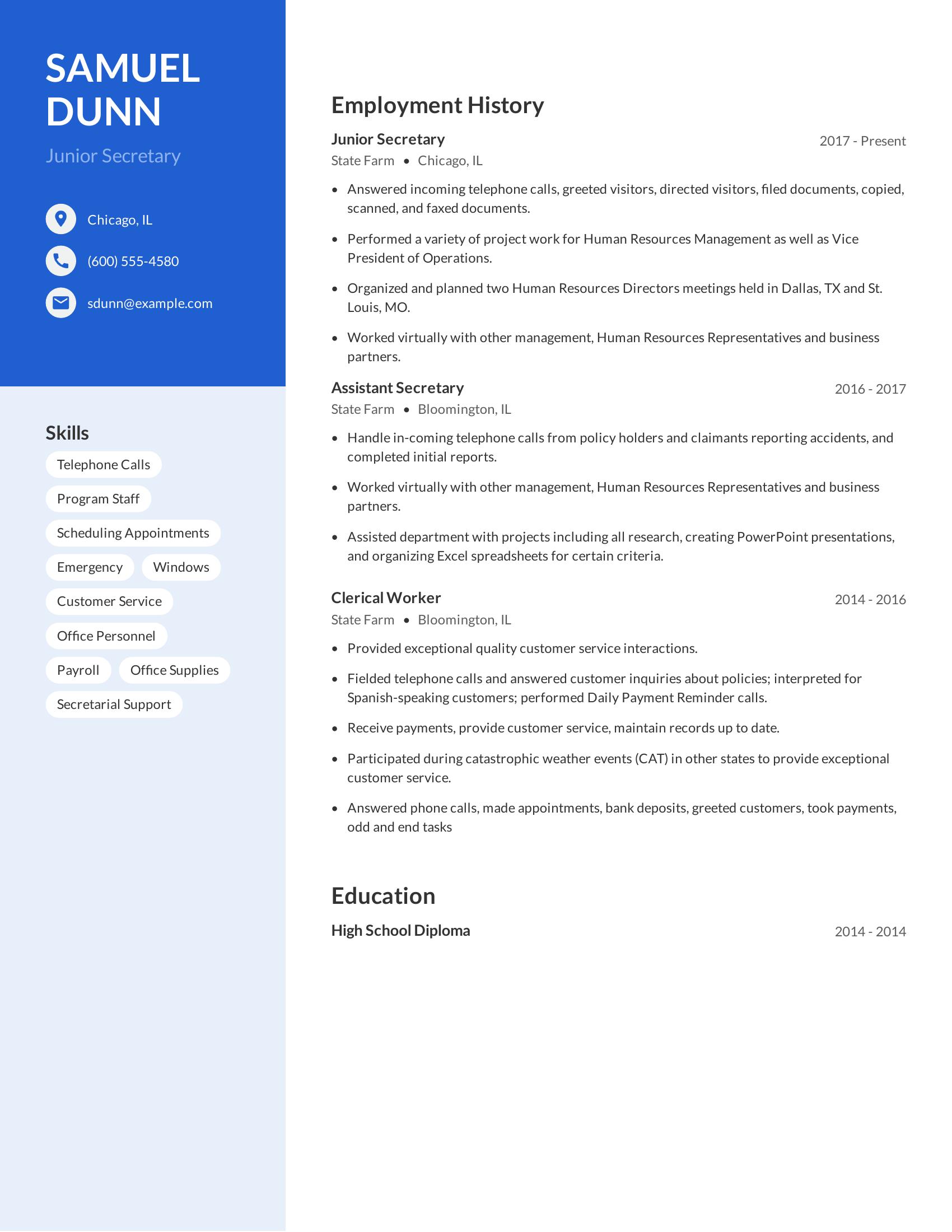
Secretary resumes should highlight strong organizational skills, exceptional communication abilities, and proficiency in office software. Key elements include varied work experience, specific tasks performed, and relevant skills. Mentioning past roles in customer service or administrative support is beneficial. A good resume also includes clear job titles, years of employment, and concise bullet points detailing responsibilities.
This resume effectively showcases relevant experience in office procedures and coordination. It details roles at different companies, highlighting tasks like organizing meetings, transcribing documents, and providing customer service. The inclusion of diverse job duties and skills such as scheduling appointments and managing attendance records demonstrates versatility and competence in secretarial functions.

Highlight relevant experience. Focus on your work as a unit secretary, including tasks like managing patient records and scheduling appointments. Mention specific software you have used.
Showcase organizational skills. Describe how you handle multiple tasks like answering phones, coordinating with medical staff, and updating patient information without delays.
Include communication abilities. Detail your experience in communicating with patients, families, and healthcare teams. Give examples of how you relay important information clearly and accurately.
A unit secretary's resume should show their skills in administration and communication. It should list their experience in healthcare settings, highlight their ability to manage patient records, and show their knowledge of medical terminology. Include details that show they can handle office tasks and support healthcare staff.
A well-written unit secretary summary should highlight your relevant experience and skills. Focus on your ability to manage administrative tasks and support medical staff.
When writing a unit secretary resume summary, clarity and relevance are key. Use concise sentences to convey your strengths.
The experience section for a unit secretary should focus on administrative duties and patient interaction. List job responsibilities and achievements.
Create bullet points that start with action verbs. Include specific examples of your work impact. Quantify achievements when possible.
A unit secretary needs practical skills to handle daily tasks.
A unit secretary needs interpersonal skills for a smooth workflow.